Are you looking for the best platforms to sell digital products on this year? If so, you’re in the right place. Selling digital products, from eBooks and downloads, to whitepapers and courses, is an excellent way for entrpreneurs to unlock new revenue opportunities.
Currently, the market for digital goods is growing at an exceptional rate. Increasingly companies and consumers alike are investing in digital graphics, webinars, and even courses. In fact, the online learning marketplace is expected to reach a value of around $602 billion by 2030.
To help you choose the right solution for your company, we’ve evaluated some of the most reputable platforms on the market, creating this list of the top contenders.
Our pick: Shopify 🥇
Shopify is one of the most popular and versatile ecommerce platforms available today. Designed to appeal to every kind of online business, including digital downloads.
Notably, the best platforms for selling digital products can come in a variety of different forms. Some focus on specific types of digital products (such as online courses, templates, or apps). Others offer versatile ecommerce solutions to suit any kind of business.
There are even tools out there that can allow you to combine selling digital downloads and other resources with sales of physical products. Here are just some of the best solutions on the market to serve a range of business needs.
What are the Best Platforms for Selling Digital Products in 2023?
1. Shopify
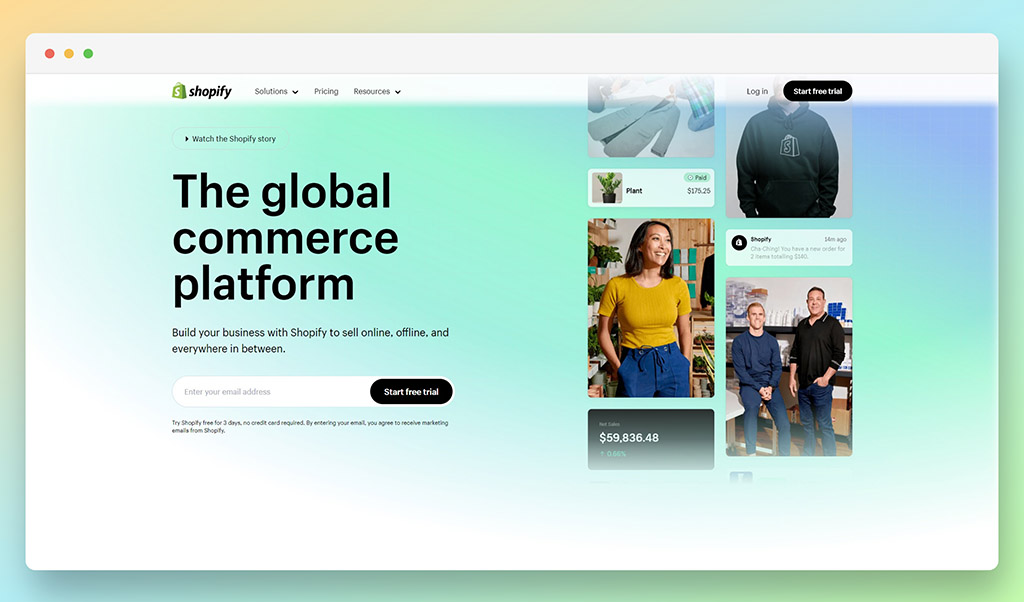
Shopify is one of the most popular and versatile ecommerce platforms available today. Designed to appeal to every kind of online business, the flexible solution will allow you to sell just about anything online, from print-on-demand and dropshipping products, to custom items and digital downloads.
You can use Shopify’s versatile tools to sell themes, photos, NFTs, and eBooks. Plus, there are various subscription apps you can use for recurring sales of courses, webinars, and community memberships. Shopify comes with everything you need to launch a business online.
There’s an easy-to-use site builder with tons of templates and themes to choose from, integrations with Google Ads and social media for promotion, and built-in SEO solutions. Plus, you’ll get a robust, and secure checkout where you can accept debit and credit card payments in various currencies.
Pricing
If you just want to add checkout functionality to an existing page or social media platform, you can access the Starter plan from Shopify for $5 per month. Shopify pricing plans which include access to the website builder and marketing tools start at $39 per month, and range all the way up to Shopify’s enterprise plan “Shopify Plus” starting at $2000 per month.
Pros 👍
- Support for selling virtually any kind of digital products
- Apps for subscriptions, memberships and course selling
- Lots of stunning themes for creating your store
- Integrated marketing and SEO tools
- Easy-to-use backend environment
- Excellent scalability
Cons 👎
- Some plugins and apps can cost extra
- Transaction fees can be expensive
How to get Shopify for $1 per month for the first 3 months?
Shopify has begun offering a special deal for sellers who sign up for a new Shopify plan. That deal?
Pay Shopify $1/month for the first 3 months of full access to the platform!
This offer is is now available on all standard plans: Starter, Basic, Shopify, and Advanced.
2. Squarespace

Squarespace is one of the most popular ecommerce and website building platforms available today. Appealing to creators, the Squarespace solution offers access to highly professional templates, designed to make your site look, and feel incredible.
Squarespace promises companies everything they need to sell anything online, whether you’re taking appointments as a service-based business with its booking tools, or selling memberships. With Squarespace, business owners can create a site in minutes, and add all of the tools and features they need to stand out online. There are even built-in tools for email marketing, and SEO.
With Squarespace, you can also unlock valuable behind-the-scenes insights into your sales, with advanced analytical tools. Plus, you can accept a range of different payment types and currencies.
Pricing
You can experiment with Squarespace for free using the platform’s 14-day trial. After that, ecommerce plans (for online selling) start at $33 per month for the basic Business plan with 3% transaction fees. The higher-priced ecommerce subscriptions come without transaction fees, and more advanced tools for merchandising and sales.
Pros 👍
- Stunning and responsive templates for every industry
- Free custom domain on annual plans
- Integrations with social media and marketing tools
- Options for selling subscriptions and downloads
- Integrated booking tools for service-based businesses
- Easy-to-use backend environment
Cons 👎
- Transaction fees on some cheaper plans
- Limited integration options
3. Wix
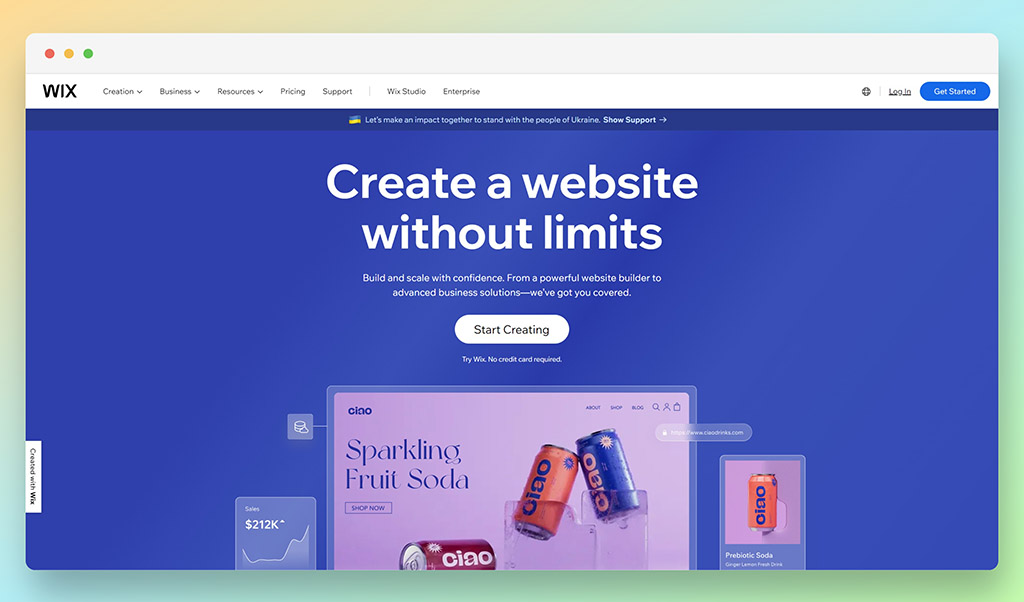
Popular among all kinds of entrepreneurs, Wix is an easy-to-use tool for creating virtually any kind of online store or website. With Wix, you get an easy-to-use and customizable website builder, with tons of built-in tools to help you showcase your brand. There’s even an AI-powered site building service.
Wix allows business owners to create landing pages, sell subscriptions to earn a passive income, and host all kinds of digital files. There are even a handful of tools for creating your own logo, domain, and other valuable assets. Wix is built with SEO in mind, and has its own accessibility features.
Plus, it comes with bonus capabilities other solutions miss, such as scheduling software, portfolio builders, and AI-driven Facebook and Instagram ads.
Pricing
Wix offers a variety of pricing packages, but if you want to sell products online, you’ll need one of the “Business” plans. These start at $27 per month for Business Basic, with 20GB of storage space, and range up to Business VIP at $59 per month with 50GB of storage. There’s also the option to choose a custom enterprise plan with bespoke pricing.
Pros 👍
- Fantastic range of templates
- Seamless integrations with leading tools
- Secure range of payment options
- Reviews, scheduling, and booking tools
- Built-in marketing and branding
- AI-driven creator tools
Cons 👎
- Some limitations on scalability
- Changing templates is difficult
4. Teachable

If you’re interested in joining the online education landscape, Teachable could be the perfect tool for selling your informative digital products. The powerful platform comes with everything you need to create and sell courses and learning resources online, including built-in payment processing.
Teachable can also integrate with a huge range of tools, from Google Analytics to marketing solutions like MailChimp and ConvertKit. Plus, you can leverage email, referral, and affiliate marketing tools within the platform. Teachable users get their own custom domain, an integrated website builder with advanced theme customizations, and exceptional member management tools.
Plus, you can sell virtually any kind of digital product you can imagine, from podcasts and how-to guides to music and audio, spreadsheets, and ebooks.
Pricing
There’s a free plan available from Teachable, although it does charge transaction fees on your sales. This plan supports 1 admin user creating a single course, digital download, or coaching service. Plus, it includes full access to Teachable’s website builder. Paid plans start at $39 per year, and range up to an advanced “Business” solution with custom quoted pricing starting at $499 per month.
Pros 👍
- Unlimited student accounts for every plan
- Excellent marketing and sales tools
- Solutions for selling every kind of digital product
- Built-in payment processing for various currencies
- Integrations with leading business tools
- Easy course creation tools
Cons 👎
- Limitations on multi-lingual customer support
- Basic free plan
5. Podia
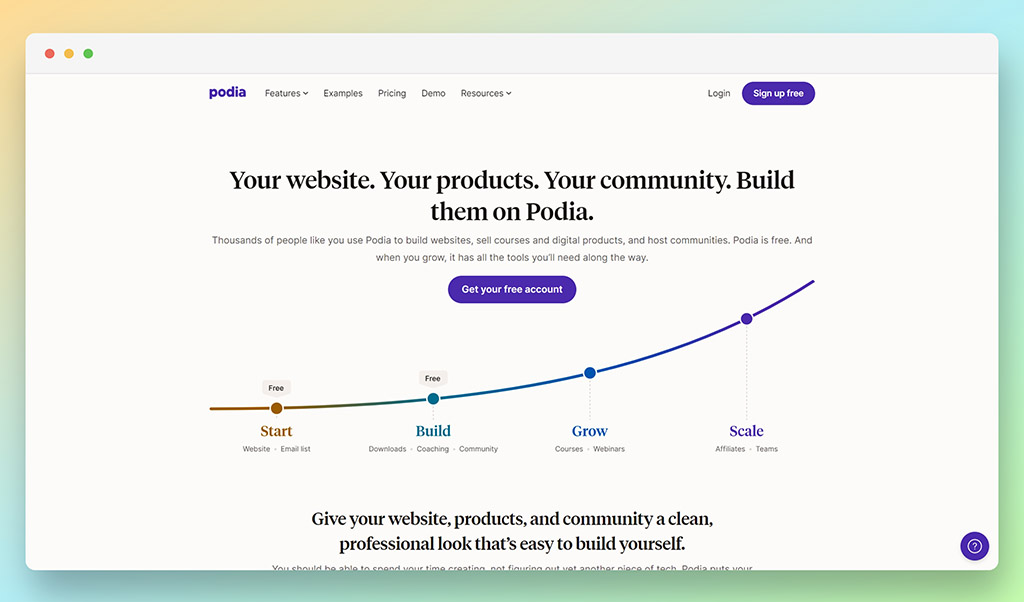
Podia is another leading solution for business owners planning to sell courses and online learning tools. However, the platform has also evolved in recent years, offering retailers the opportunity to create community environments, and sell a wider range of products.
Podia comes with its own intuitive website builder, which doesn’t require any coding knowledge to use. There are built-in payment processing solutions, and multiple sales options. For instance, you can choose to sell one-off downloads, subscriptions, services, and bundles.
Plus, Podia makes it easy to nurture and grow your audience, with multimedia tools for creating forums, affiliate marketing tools, and endless helpful resources. You can even create your own blog to boost your presence on the search engines.
Pricing
Podia has a free plan (with 8% transaction fees) which includes access to its website building tools, email marketing, community features, and support for 1 download or coaching product. Paid plans start at $39 per month for unlimited coaching and downloads. Plus, there’s an advanced “Shaker” plan for $89 per month, with chat support, affiliate marketing and third-party code access.
Pros 👍
- Fantastic membership and community tools
- Plenty of options for branding your online presence
- Built-in marketing and sales tools
- CRM and CMS technology included
- Support for multiple payment methods
- Excellent customer service
Cons 👎
- Limited free plan
- Affiliate marketing is only available on the most expensive plan
6. Easy Digital Downloads
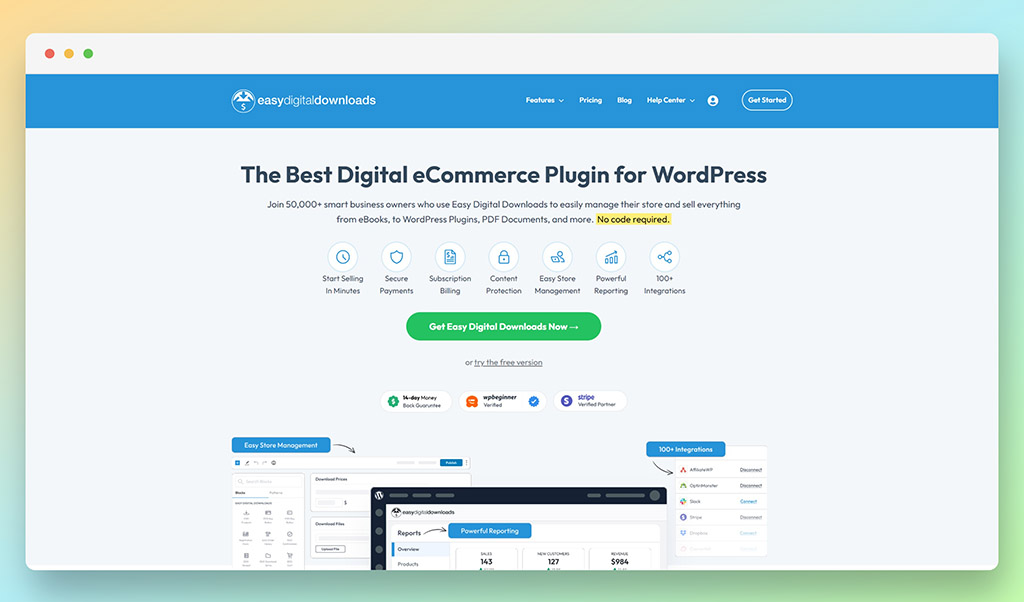
Probably one of the better-known solutions for selling digital products in the modern world, Easy Digital Downloads, or EDD is actually a plugin for WordPress. The no-code solution allows you to transform your existing blog or website into a sales solution, with built-in payment processing, content protection, and powerful reporting tools.
With Easy Digital Downloads, you can sell everything from recurring subscriptions to PDF documents, fonts, podcasts, quizzes, and webinars. EDD is even a verified Stripe partner, so you know every transaction will be kept secure. Plus, there are options for a range of payment options, including PayPal, Apple Pay, and Google Pay.
EDD even integrates with various leading resources for sales and marketing, such as Dropbox, OptinMonster, and ConvertKit. You can also create custom discount codes, gift cards, and offers for your customers, to increase sales.
Pricing
EDD plans are offered on an annual basis, which can save you quite a bit of money in the long term. The plans start at $199 per year for the Personal plan, with access to all of the core features. There’s also an Extended plan for $399 per year with subscription selling, and a Professional plan with recommended product options and more for $599 per year. Users can access all of the features of EDD with an “all access” pass for $999 per year.
Pros 👍
- Unlimited transactions and products on all plans
- Integrated marketing and sales tools
- Powerful reporting and analytics
- Multiple payment methods to choose from
- Integrations with leading business tools
Cons 👎
- No monthly plan options
- Only suitable for WordPress users
7. Gumroad

If you’re looking for a powerful yet simple solution for online selling, Gumroad could be the ideal choice. The straightforward solution comes with a variety of fantastic features, including a flexible page editor, custom domain options, and social media integrations.
You can use Gumroad to sell memberships and subscriptions, and provide your customers with the option to pay for your products in a variety of ways. The platform also automatically collects and manages VAT on your behalf, and offers a range of discount and offer options.
Gumroad is great for selling license keys for software, multiple versions of different documents and more. Plus, the company can create lightweight DRM solutions to protect your work.
Pricing
Gumroad takes a slightly different approach to pricing than most of the platforms on this list. Rather than paying for a monthly or annual subscription, you’ll simply give Gumroad 10% of the earnings from all of your sales.
Pros 👍
- Extremely easy to use for beginners
- Options for selling downloads, memberships and subscriptions
- Various payment types and currencies
- Automated VAT calculation
- Tools for protecting your assets
- Integrations with leading platforms
Cons 👎
- Commission fees can be quite high
- Some limitations on customization options
8. Payhip
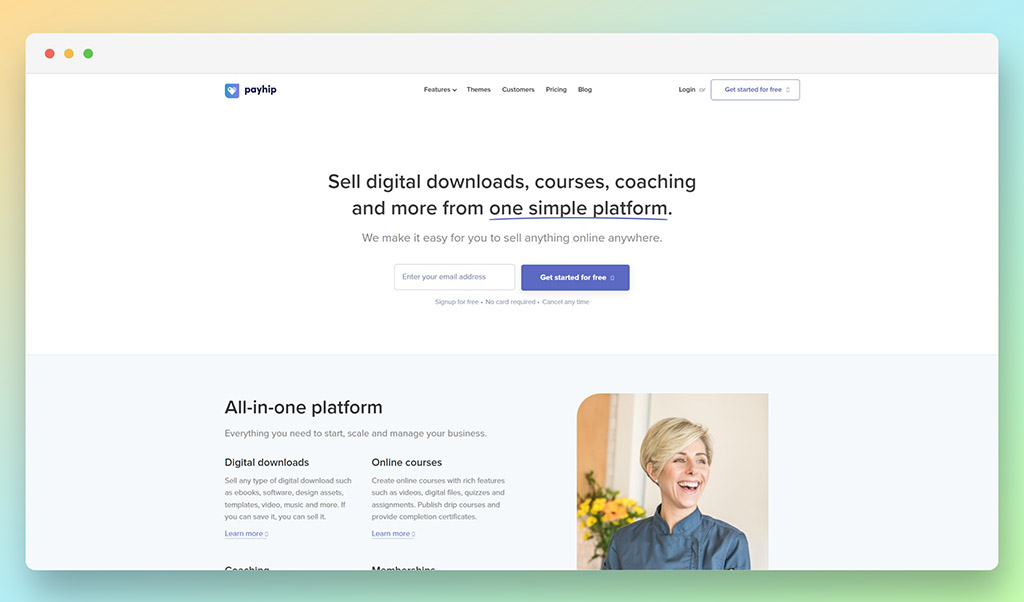
Promising vendors an easy way to sell digital downloads and courses, Payhip is an all-in-one platform for simple online selling. The solution comes with everything businesses need to start and scale their business, regardless of what they want to sell. You can sell courses, ebooks, design assets, coaching sessions, memberships, and even physical items.
Payhip has it’s own website builder, with access to tons of customizations to help you enhance your brand image. You can connect a custom domain, or embed Payhip’s functionality into your existing website. Plus, the company automatically handles tax and VAT on your account.
Payhip even comes with a handy selection of marketing tools, to help you connect with your audience and nurture leads over time. What’s more, the solution integrates with PayPal, Stripe and more.
Pricing
There’s a free plan available for Payhip which includes access to all the features, unlimited products and unlimited revenue, but it also has a 5% transaction fee. The paid plans start at $29 per month for the plan with a 2% transaction fee, or $99 per month if you want no transaction fees.
Pros 👍
- Unlimited products and revenue on every plan
- Support for selling all kinds of digital products
- Integrated automations for tax and VAT management
- Email and online marketing tools
- Easy to use store builder
- Various payment options
Cons 👎
- High transaction fees on some plans
- Limited integrations
9. SendOwl

Another modern platform designed for creators, SendOwl offers a variety of tools to help users sell digital products anywhere. The solution supports all kinds of digital products, including eBooks, audiobooks, software, memberships, event tickets, and online courses.
SendOwl’s all-in-one solution ensures you can deliver products quickly and safely to every customer, and even boost your chances of sales with handy marketing features. There are tools for one-click upsells, cart abandonment emails, and affiliate marketing.
Plus, with built-in analytics, you can easily find new ways to enhance your revenue, with access to behind-the-scenes data and metrics.
Pricing
Every SendOwl plan comes with access to all of the SendOwl features, as well as integrations with PayPal and Stripe. The first plan starts at $9 per month, after a generous 3 month free trial, though there is a per-order management fee of 5% and a 10GB storage limit. Other plans include the Growth package for $15 per month and Pro for $39 per month with cheaper fees and more storage.
Pros 👍
- Integrations with a range of online platforms and tools
- Options for multiple sales strategies
- Custom branding and marketing tools
- Analytics and metrics
- Upsell and subscription tools
- Excellent security
Cons 👎
- No website builder
- High “management” fees on some plans
10. Sellfy
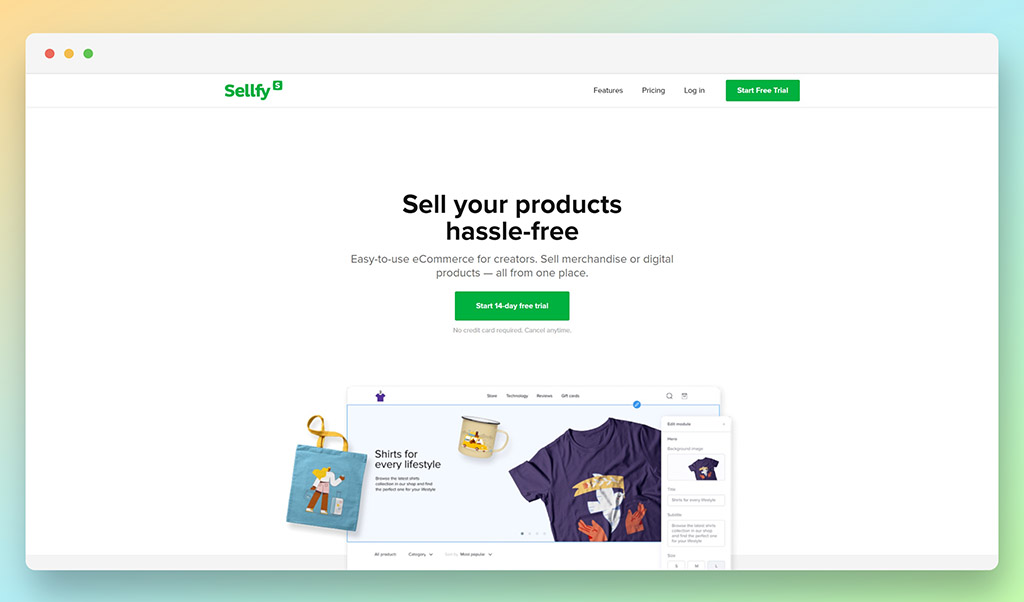
Perfect for beginners, Sellfy offers a hassle-free way for creators to sell all kinds of products online. You can sell branded merchandise, using print-on-demand partners, as well as digital products like ebooks and downloads using the same platform.
Sellfy makes it easy for anyone to start an ecommerce store of their own. The platform is home to thousands of artists selling products like videos, comic books, and music content. Plus, the all-in-one platform comes with built-in marketing features to help you grow online.
Business leaders can use Sellfy to create a stunning storefront in minutes, and sell digital products of all types as one-off products or subscriptions. You can even automatically translate your website into any language and customize your Sellfy checkout.
Pricing
Sellfy offers a range of pricing options to choose from, with discounts available for annual or two-year plans. The basic “Starter” plan starts at $29 per month when you pay monthly, for up to 10k in sales per year, email marketing and a custom domain. Prices range up to $159 per month for priority support, product migration, and $200k in sales per year on the Premium plan.
Pros 👍
- Cart abandonment and product upselling tools
- Drag-and-drop website builder
- Integrated sales and marketing tools
- Exceptional ease of use for beginners
- Embed options to take your website and sales anywhere
Cons 👎
- Sellfy branding on some of the cheaper plans
- No community features
11. Webflow
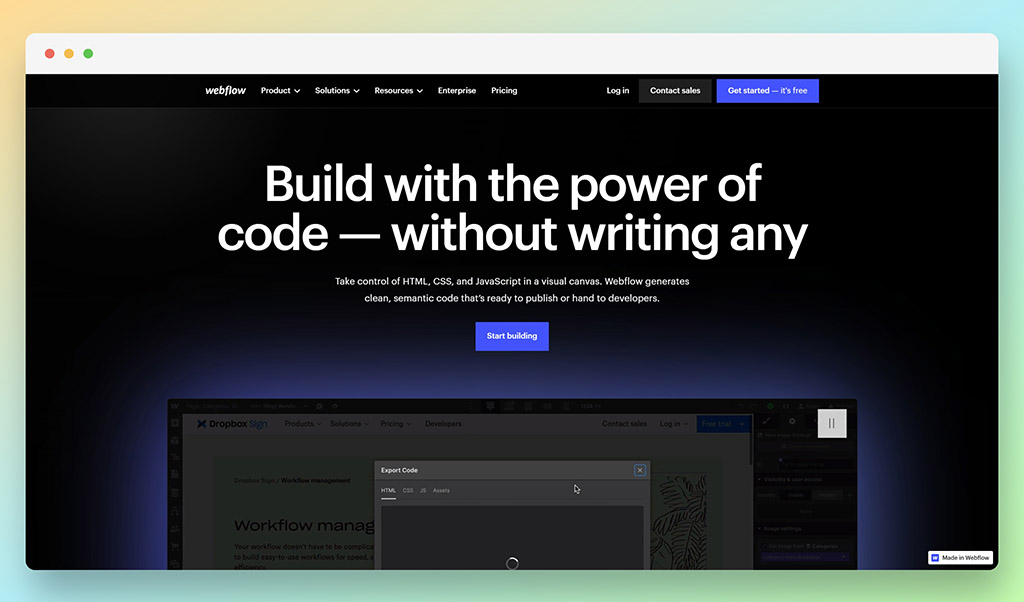
One of the more flexible solutions on this list, Webflow allows users to take control of JavaScript, HTML, and CSS in a visual canvas, ready to publish. You can build, launch, and update websites quickly, without developer support, and go beyond the basics of standard templates.
The ecommerce features on Webflow give business leaders the freedom to sell virtually any kind of product, including members-only courses and tools. Plus, you can optimize your website for SEO, boosting your chances of standing out on the search engines.
Webflow also provides useful tools business owners can use to collect leads and prospects for their company, such as online forms and landing pages.
Pricing
There’s a free Webflow plan for beginners, with a webflow.io domain and 1GB of bandwidth. Paid plans start at $14 per month with a custom domain, though there are no CMS tools included. Other options include the CMS plan at $23 per month, the Business plan for $39 per month, and an enterprise plan with custom pricing.
Pros 👍
- Excellent tools for both non-coders and developers
- Automated workflows for sales and marketing
- Collaboration features to unify teams
- Support and resources for every business
- Fast and secure selling options
Cons 👎
- Limited features on cheaper plans
- Some limitations on bandwidth
12. Kajabi

Built for content creators, Kajabi is an all-in-one solution for selling podcasts, memberships, coaching programs and more. You can sell all kinds of in-depth resources, create your own membership site, and charge a monthly fee to your customers for access to your content.
Plus, the customizable solution doesn’t require any coding or programming knowledge. You can even design your courses on the Kajabi platform, with course outlines, AI-driven tools, and solutions to help you create more effective landing page copy. Kajabi will even allow you to leverage email, social media marketing, and full sales funnels.
Kajabi offers multiple payment processing tools, in-depth analytics and reports, and a massive help center full of resources to get you started. There’s also the option to create your own branded app for customers on mobile.
Pricing
Kajabi’s payment plans are a little more expensive than some alternatives, with the basic plan starting at $149 per month. However, there are no transaction fees on any plan, and you get unlimited emails and landing pages on every package. Options range up to the “Pro” plan for $399 per month.
Pros 👍
- Excellent range of options for digital content
- App creation tools for mobile users
- Unlimited marketing emails and landing pages on all plans
- Built-in tools for sales and marketing
- Customizable shopping cart
- Tutorials and guidance for every user
Cons 👎
- Slightly expensive pricing
- No options for physical product creators to sell online
Choosing the Best Platform for Selling Digital Products
There are countless platforms out there that allow companies to go beyond the basics of selling on Amazon and the Etsy creative market. All of the options above support creators in selling various digital products, and most come with built-in tools for marketing and boosting sales.
The right option for you will depend heavily on your business plan, and strategy for online selling, as well as your budget. Remember, many of the solutions mentioned above come with free demos and trials, so you can always test multiple platforms before making your decision.




Comments 0 Responses